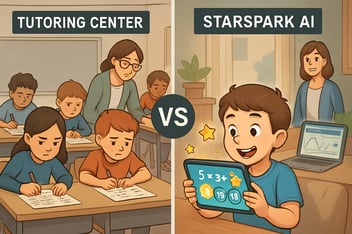
“I hate math.”

1. Understand What’s Behind the Frustration
- Low confidence: They’ve convinced themselves they are “not a math person.”
- Skill gaps: Missing one key concept can make everything that follows feel impossible.
- Pace and pressure: Classrooms move quickly, leaving little time for personalized help.
- Lack of relevance: Math feels disconnected from real life.
“Which parts of math feel hardest?”
“When do you start to feel frustrated?”
2. Reframe Mistakes as a Normal Part of Learning
- Remind them that every mistake helps their brain grow.
- Praise persistence over perfection.
- Share your own stories of learning through trial and error.
3. Build Small Wins into Every Week
- Give short, focused practice sessions instead of long worksheets.
- Track progress together with small goals.
- Celebrate effort as much as accuracy.
4. Make Math Feel Real and Relevant
- Cook together and double a recipe to explore fractions.
- Estimate totals while shopping.
- Play board games that involve counting or strategy.
5. Use Tools That Adapt to Your Child’s Needs
6. Model a Positive Attitude Toward Math
“Math used to be tough for me too, but I got better with practice.”
“Let’s figure this out together.”
7. Focus on Progress, Not Perfection
The Bottom Line
Help Your Child Feel Confident in Math Again
Frequently Asked Questions
1. Why does my child say they hate math?
Children often say they hate math because they feel confused, left behind, or anxious about making mistakes. It usually stems from frustration or a lack of confidence, not an actual dislike of numbers.
2. How can I help my child enjoy math again?
Make math part of everyday life. Use cooking, games, or shopping as opportunities to practice skills naturally. Focus on encouragement and celebrate small wins.
3. What if my child is already behind in math?
Start by identifying where the gaps are. Work on one concept at a time and use personalized learning tools like StarSpark.AI that adapt to your child’s level to rebuild understanding step-by-step.
4. How can technology help with math learning?
Modern AI learning platforms personalize instruction, provide instant feedback, and make math more engaging. Tools like StarSpark.AI are built to help students understand why answers are right or wrong, improving long-term comprehension.
5. How long does it take for a child to regain confidence in math?
Every child is different, but most begin to feel more confident within a few weeks of consistent, positive practice. The key is steady effort, encouragement, and using the right support system.




